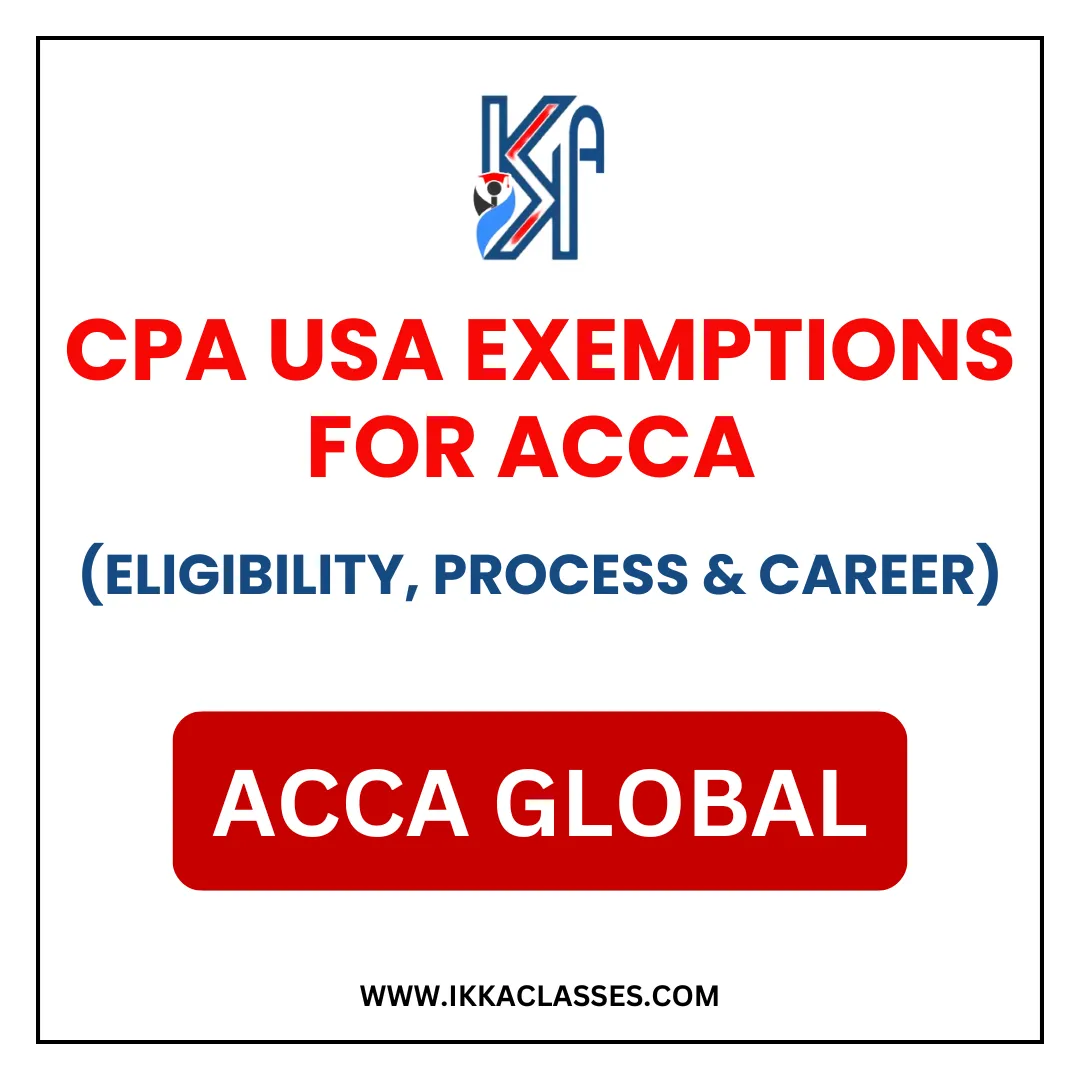Are you an ACCA member dreaming of adding the prestigious CPA USA credential to your resume? That’s not rare. Many finance professionals opt to go for dual specialisations and degrees. Others wish to uplevel in their career trajectory.
But here’s the thing: The path from ACCA to CPA USA isn’t as straightforward as many hope.
Now, you might have your doubts:
- Can I convert CPA to ACCA? If so, are there any exemptions?
- Is CPA USA after ACCA easy or tough?
- What are the requirements for CPA USA?
Let’s tackle these questions head-on and give you the real scoop on what to expect.
Table of Contents
ToggleCPA USA Exemptions For ACCA
Before we go further, let’s clarify what we mean by exemptions. CPA USA exemptions for ACCA would essentially mean:
- Skipping certain CPA exam sections
- Getting credit for your ACCA studies
- Reducing educational requirements
Sounds great, right? Unfortunately, here’s where things get tricky.
Most US state boards do NOT provide formal exemptions for ACCA holders. Because the CPA USA license is regulated by individual state boards, not by a single national authority.
Each of the 55 jurisdictions in the U.S. (50 states + D.C. + territories) sets its own education and exam eligibility rules. And most of them don’t list ACCA as an accredited U.S. degree equivalent.
This means even with your ACCA qualification, you’ll likely need to:
- Pass all four CPA exam sections (AUD, BEC, FAR, REG)
- Meet the 150-hour education requirement
- Complete the experience requirements
Now, you may think, why do people say ACCA helps? Because, while CPA USA exemptions for ACCA holders are limited, your ACCA qualification is still valuable. It provides a strong foundation that can make your CPA studies more manageable.
Can ACCA Members Pursue CPA USA Directly?
Yes, ACCA members can pursue CPA USA, but it’s not a direct or shortcut route. While both are prestigious accounting qualifications, the CPA has eligibility standards.
Every U.S. state has its own Board of Accountancy, and each one sets its own rules. That means:
- You must select a U.S. state/jurisdiction where you want to get licensed.
- Most states require 150 credit hours of education (equivalent to a U.S. bachelor’s + some postgraduate coursework).
- If your education was outside the U.S., you’ll need a foreign credential evaluation, typically through NASBA’s NIES service.
Also, a common barrier that students face in CPA USA is that ACCA alone might not fulfill the 150-credit requirement. In that case, some candidates:
- Combine their ACCA + undergraduate degree for evaluation
- Enrol in bridge programs (for instance, MS in Accounting) to close the gap
Choose states with more flexible rules (e.g., Alaska, Guam, Colorado)
Is CPA Easy After ACCA?
Look, if you’re thinking CPA will be a breeze after ACCA, let’s break it down for you. Past exam results data indicate that both the CPA and ACCA exams are difficult to crack and require a lot of preparation.
The biggest challenge you may face is adjusting to US GAAP vs IFRS, learning US tax codes, and ethics. Besides, US business law, securities regulations, and corporate governance structures will be completely new territory.
However, if you have already passed ACCA, you are already comfortable with:
- Financial reporting concepts (just need to switch from IFRS to US GAAP)
- Audit procedures and risk assessment
- Basic taxation principles
- Management accounting and business analysis
Having both ACCA and CPA USA can boost your profile for roles in global accounting, auditing, and taxation.
But note:
- CPA USA does not grant U.S. work rights. If relocation is your goal, you’ll still need a visa or study-to-settle pathway, such as an MS in the U.S.
On the flip side, CPA can add weight in India-based Big 4s, MNCs, and U.S.-focused consulting firms.
What Are The CPA Exam Requirement Exemptions Available?
CPA USA exam exemptions are special allowances that let certain candidates bypass some educational or experience requirements. But CPA USA exemptions for ACCA are not direct.
The most important thing to understand is that the State Boards set the CPA license requirements in their jurisdiction. So, it’s up to the State Boards to make decisions about CPA exemptions for ACCA.
A few states are open to counting professional certifications like ACCA toward education requirements, but not all are. In many jurisdictions, such credentials are treated as work experience, not formal education. There is no central exemption policy. You will need to:
- Choose a state based on your career goals
- Check their specific licensing page via the AICPA resource hub
- Email or call the board for clarity, and they will assess your documents individually.
So, who gets the exemptions now?
Only U.S. Degree Holders can skip the foreign credential evaluation process entirely. Their transcripts are directly accepted by state boards.
How Do I Apply For CPA Course Exemptions If I Am An ACCA Holder?
As discussed above, there’s no standardized “CPA exemption application” for ACCA holders because most states don’t offer them anymore. But if you are determined to try, here’s how the process typically works:
Step 1: Pick Your State Board. Since each of the 55 state boards sets its own rules, you’ll need to choose where you want to be licensed. Some states are more flexible than others, so do your homework first.
Step 2: Contact the State Board Directly. Don’t assume anything. Call or email the specific state board and ask about their current exemption policies for ACCA holders. Get it in writing if they say exemptions are available.
Step 3: Get Your Education Evaluated. Even if exemptions exist, you’ll need a NASBA-approved credential evaluation service to assess your ACCA qualification. This is non-negotiable and costs around $200-400.
Required Documentation:
- Official ACCA transcripts and certificates
- Academic transcripts from your degree (if separate from ACCA)
- Course syllabus and curriculum details
- Professional work experience documentation
- All documents translated to English if needed
Timelines and Fees:
- Education evaluation: 6-8 weeks, $200-400
- State board review: 4-12 weeks (varies by state)
- Application fees: $50-200 per state
- Total process: 3-6 months minimum
What Are CPA USA Exemptions Based On Other Professional Qualifications?
Now, while ACCA students don’t get any kind of exemptions, let’s see what the case is with other professional programs like MBA, CA, CIA, etc.
Professional Qualification | Potential CPA Advantage | Exemption Scope |
Chartered Accountant (CA – India/Pakistan) | Sometimes considered for credit hour evaluation | Education evaluation may consider CA coursework as partial credit, but exams still required |
CMA (US) | May meet educational prerequisites | No direct exam exemption, but often fulfils credit hour needs |
CFA (Chartered Financial Analyst) | Recognised in some states | Fulfils business-related subject areas; no test exemptions |
CIA (Certified Internal Auditor) | Helpful for audit-focused boards | No formal exemption; useful for meeting ethics/experience requirements |
MBA (Finance/Accounting) | Commonly recognised | Often satisfies the 150-credit-hour rule; no exam paper waiver |
M.Com / B.Com / PG Diplomas | Evaluated by credential services | Depends on accreditation and curriculum alignment |
Bcom | Considered a professional credential | Can cover foundational accounting hours required by most state boards. |
What Are The Benefits Of Seeking CPA USA Exemptions?
The following are the benefits of seeking CPA USA exemptions after ACCA degree:
- You save time by avoiding repeated content: Instead of slogging through basic accounting principles again, you can jump straight to the US-specific content that actually matters. Just like fast-forwarding through the boring parts of a movie you’ve already seen, you can skip studying repetitive stuff.
- Your Wallet Will Thank You: Educational upgrades aren’t cheap. If you can get exemptions, you won’t have to spend on costly bridge programs or master’s degrees just to qualify.
- Potential to enter the U.S. job market quicker via focused CPA prep.: Every month saved in exam prep is a month you can put toward job hunting, visa processing, or onboarding into U.S.-based roles. That’s months of potential salary you are not missing out on.
- Strategic Career Positioning: Exemptions let you focus your energy on what really matters – the US GAAP differences, local regulations, and networking. You’re not wasting time on fundamentals you have already mastered through ACCA.
Are CPA USA Exemptions Worth It For ACCA Professionals?
Not everyone has the same career trajectory. Someone’s a fresher thinker, is it worth chasing limited exemptions? Another is an ACCA affiliate guy with 5+ years of experience, thinking of becoming a CPA. Now, should both of them opt for exemptions? Or is a direct route better?
Now, if you are an ACCA affiliate with 5+ years under your belt, every month counts. You’ve got bills to pay, career momentum to maintain, and probably limited study time. Exemptions can make a lot more difference for you.
To help you decide, below is a curated checklist of when to go and when to skip exemptions:
When Exemptions Make Sense:
- You are working full-time and need to minimize your study load
- You are already in the US or have concrete plans to move
- Your employer is sponsoring/supporting your CPA journey
- You have a clear pathway to the 150-hour requirement
When to Skip the Exemption Hunt:
- If you’re not planning to work in the US, the exemption process might be more trouble than it’s worth. The ACCA exemption calculator can help you figure out what you already have.
- If you have huge credit gaps (like 60+ additional credits needed), exemptions won’t save you much time or money.
TL;DR
Ask yourself these three questions:
- Will exemptions save me more than 6 months of study time?
- Do I have a concrete plan to use CPA in the US market?
- Are the exemption pursuit costs (time, money, stress) worth the potential savings?
If you answered “yes” to all three, chase those exemptions. If no, then the direct route is a safer option.
Frequently Asked Questions About CPA USA Exemptions For ACCA
Do ACCA Members Get CPA Exemptions?
No, ACCA members do not receive any direct exemptions from the CPA (Certified Public Accountant) exams.
What Are The CPA USA Requirements For ACCA Holders Specifically?
ACCA holders need to meet the same requirements as other international candidates – a bachelor’s degree, 150 credit hours, and specific accounting/business coursework.

